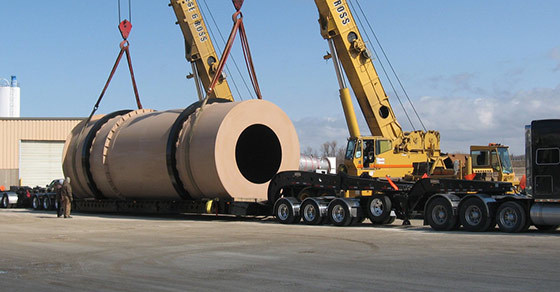When looking to agglomerate material, many options are available. Agglomeration equipment manufacturers often specialize in a particular industry, type of agglomeration equipment, or category of agglomeration solutions.
As the capabilities, offerings, and experience of each manufacturer vary significantly, finding the right agglomeration equipment provider requires a thorough evaluation of suppliers based on several key criteria.
As the leading supplier of custom agitation agglomeration (tumble-growth or wet granulation) equipment, FEECO can offer extensive support in every step of the process to commercial-scale production, from process development to post-sale support. What follows are some of the most critical factors we recommend you consider in evaluating potential original equipment manufacturers (OEMs) in order to reach a solution that not only provides optimal processing, but will perform reliably in the long term.
AGGLOMERATION EQUIPMENT TESTING & Process Development
Whether working with a novel or established application, process development and agglomeration testing capabilities are often vital in the design of commercial-scale agglomeration equipment and systems. All materials, and even the same material from different sources, respond uniquely to agglomeration as a result of the specific chemical and physical makeup of the material source.
Testing programs such as those carried out in the FEECO Innovation Center reveal how the specific material will respond to agglomeration, and in turn, how the equipment will need to be designed to best work with those characteristics. This type of testing significantly de-risks the project and provides valuable data for the design and scale-up process.
Similarly, testing may reveal that the desired result is better achieved through a combination of equipment. When multiple pieces of equipment are required, testing not only reveals the best configuration, but it also provides essential process details presented by the combination of equipment, informing on parameters such as binder and material feed rates, retention times, and more. Agglomeration equipment providers that have the ability to work through this type of process development and consider the process as a complete production line instead of just a single piece of equipment offer a significant advantage.
The FEECO Innovation Center offers a variety of batch and continuous agglomeration equipment for testing batch trial runs and continuous pilot-scale runs. Dryers and various other types of support equipment are also available to achieve representative continuous processing.
Pelletized Sulfate of Potash (SOP) produced during testing in the FEECO Innovation Center
Toll Processing
The ability of an OEM to toll product is not always necessary, but often helpful, particularly when developing a new process. Tolling capabilities allow producers to further de-risk their project by testing it on an even larger scale, prior to investing in their own plant. Tolling can also be used to expedite initial production in order to bring a product to market more quickly, or to produce samples for market testing.
Flexibility & Customization
The diverse nature of materials and agglomeration equipment demands a flexible approach to equipment design. Base models often serve only as a starting point from which to build, instead of a blanket solution for any application.
The ability to make design modifications in terms of sizing, materials of construction, component layout, and more, are all essential to optimizing the equipment for efficient, long-term reliability; agglomeration equipment designed around its intended application not only maximizes process efficiency, but it also ensures that equipment is fit to withstand the rigors of the specific job.
In addition to improving equipment performance, customization can also be used as a way to improve the process as a whole. For example, the use of a variable frequency drive (VFD) in agglomeration equipment allows operators to adjust equipment operation in tandem with start-up and shutdown, as well as in response to changing production conditions.
Custom FEECO Agglomeration/Conditioning Drum (Agglomerator) for processing phosphate rock
Experience & Knowledge
Expertise is perhaps never more important than when working with agglomeration equipment. The many variables, combined with the inconsistent responses of different sources of material make extensive experience pivotal to the success of equipment.
Select a manufacturer with either experience around the material to be processed, or with a diverse background that will help to inform decision making (a diverse material background gives equipment providers a critical edge over those with limited experience, allowing them to more quickly identify the most ideal solution based on a wealth of knowledge on material behavior).
Even when working with a well-established process, past experience often helps to guide important decisions such as material(s) of construction, feed setup, spray locations, and more.
Proven Design
Proven equipment design is essential; many now-defunct companies have left plant managers with sub-par equipment and few options. Look for a manufacturer that can prove their work through project profiles and customer references.
An in-house service department is also a good indicator that the manufacturer has a history of supporting their equipment through spare parts, troubleshooting, and other parts and service support. An internal service department also often results in the refinement of designs throughout the years, as service technicians see repeat issues.
Quality Fabrication
High-quality fabrication is important for any operation where minimizing downtime and repairs is a central focus. Quality fabrication goes beyond selecting the proper materials of construction; machined parts, welds, and other physical aspects of the equipment must follow tight tolerances and abide by strict quality control practices to ensure long-term reliability.
The moving parts of agglomeration equipment must be able to operate smoothly, whether the unit is empty, under full load, or under the added burden of loading conditions. Components must be machined and fitted for seamless operation that does not promote added stress to the equipment or any of its components.
FEECO Pugmill Mixer (Paddle Mixer) in fabrication
Ongoing Support
Ongoing support in the form of training, maintenance, spare parts, and repairs is vital to maintaining operational efficiency and promoting equipment longevity. Be sure to select a manufacturer that has a proven track record of post-sale support. These services are a critical lifeline in the event of a problem, or when operators need assistance in optimizing the process and performance of the unit(s) to maximize efficiency.
Conclusion
Choosing the right agglomeration equipment manufacturer often means the difference between an efficient, reliable operation, and excessive downtime and repair work. In selecting a provider for a given application, consider factors such as manufacturer experience, testing and process development offerings, ongoing support, and more, to ensure the best result.
FEECO International is the leading expert in non-pressure (tumble-growth/agitation) agglomeration (also known as wet granulation) systems and equipment, including disc pelletizers, agglomerators, pin mixers, and pugmill mixers. In business since 1951, our decades of experience, paired with our extensive testing and tolling capabilities, and parts and service support capabilities provide the most comprehensive and informed offerings on the market. For more information about our agglomeration equipment and services, contact us today!



